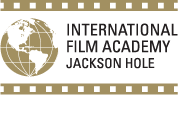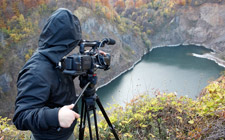


 Summer 2010
Summer 2010
An Introduction To Environmental Documentary Filmmaking
One-week course for those with limited or no prior experience
June 14 - 18, 2010
In this intensive one-week course, students will gain practical experience in documentary filmmaking. Through hands-on workshops, study of previous work, and application of theory combined with technique in the field, students will come away with a working understanding of the filmmaking process. Over the week, students will plan, shoot, and edit a short film - using the majestic setting of Jackson, Wyoming as their backdrop. Students will share their works in progress with the class for analysis and feedback.
We encourage students to bring their own cameras and lap tops if they are already gaining experience with the equipment. Otherwise we will supply the equipment.
Intermediate Course on Environmental Documentary Filmmaking
June 21 - 25, 2010
This intensive course takes students who already have some experience and knowledge of filmmaking to the next level. There will be more emphasis on production techniques such as using the camera, sound, lighting, interviewing, the use of b-roll etc. Students will be out in the field shooting but there will be a focus on gaining the learning tools that they can then use and practice outside of class.
Who Should Apply? Someone who wishes to be in a total immersion course to learn more, maybe develop skills for a future career in documentary filmmaking or have a set of tools to work independently and create great films.
When:
Monday June 14 - Friday June 18 - for beginners
Monday June 21 - Friday June 25 - intermediate
Where:
Teton Science Schools
Jackson Campus
700 Coyote Canyon Rd
Jackson Hole, WY
Cost per course: US $595.00
Email the International Film Academy (info@internationalfilmacademy.com) for more information on the courses.
Academy Core course is a mix of field and classroom
This is not meant to be a ‘film study’ school; learning production is done ‘hands-on’ in the field. Screenings and critical discussions of films help to give a solid historical/aesthetic background. Film screenings are also analyzed for use of technology, interview techniques, lighting, directing, writing, etc.
Documentary production requires creative collaboration and teamwork. Class projects are done in teams of 3 to 5 crewmembers (depending on project needs and class size). Team assignments/positions change with each project so that crew positions (producer, director, camera/sound/lighting, editor) are practiced by each individual, giving students a chance to discover their different strengths and develop new skills.
Number of students per class:
Each class has between 8 to 12 students. Since filmmaking challenges people’s sense of themselves, their self-worth, creativity, etc., keeping the classes small guarantees time for individualized attention as well as group feedback, as well as plenty of access to production and postproduction equipment.
Approximate overview of a typical one week's course:
Monday Morning: Introduction
How do documentary films work? What makes for a good documentary? What are the different approaches and styles to a subject? Narration? Characters? How does the camera work as a character in the story? Students are encouraged to bring any clips they particularly like, analysis of these selections from a film production standpoint.
Monday Afternoon: Story Ideas
What are the roles on a crew? Larger productions vs. small crews, how technology has changed/how things are the same. Production roles for students in the class. Teams, pitching ideas for projects to the class. Writing initial treatment and story concepts.
Tuesday Morning: Research, Pre-Production
Finalizing story ideas, researching specific topics. Identifying characters. Whose story is it? Perspective? Theme? Underlying message or goals? Visualization of the story?
Tuesday Afternoon: Pre-Production, Location Scouting/Equipment Tests
Preparing to shoot, use of the camera, sound equipment, test shoots in class: interview setup, b-roll location work, remaining time for location scouting, research, test shoots if time allows
Wednesday Morning: Production on Location
Meet up to discuss objectives, finalize contacts and crew positions, equipment check shoot in the field
Wednesday Afternoon: Production “Check In”
Review questions, troubleshoot, head back out and keep shooting, recap at the end of day, assess any final pickup shots
Thursday Morning: Final Production Work
Pickup shots, remaining interviews or b-roll, any inserts or establishing shots not yet filmed, begin logging footage
Thursday Afternoon: Post Production
Overview of editing platform, steps of editing from logging, assembly, rough cut, fine cut, audio mix, color correction, final cut, DVD export. Students log foot age, noting paper edit ideas
Friday Morning: Editing Rough Cuts
Assembling the “spine” of the story - interviews, narration, supporting footage. Adding sound or temp music, screening to classmates for feedback
Friday Afternoon: Fine Cuts
Reworking footage, polishing transitions and sequences, adding titles and mixing audio levels, color correction and other touches, screening work to class, final suggestions. OPTIONAL DVD output, students are encouraged to continue working on projects on personal equipment or with finalized footage if desired.
Friday Evening: Conclusion
Wrap up, discussion on festivals and other opportunities to screen work, reflection on lessons learned, networking opportunities, exchanging information for future projects!
Participants come away with a DVD containing productions they have worked on.
Teacher Of The One-Week Documentary Filmmaking Courses
Danny Ledonne is a graduate of Emerson College's film program in Boston. He has been exploring the power of the moving image since 1998.
Danny has served in camera and grip/electric departments on dozens of short films and music videos as well as several features. He has worked as director of photography on several award-winning short films, editor for a feature-length experimental travel documentary, and shot and edited a short documentary in the wilderness of east Africa. He has also produced and edited a feature length documentary about the future of video games as an art form, which premiered at AFI Fest in Los Angeles in November 2008 and has circulated wid ely at festivals and on university campuses since.
A Colorado native, Danny is currently enrolled in the MFA film and electronic media program at American University in Washington, DC. He is the owner/operator of Emberwilde Productions, serves as technical director for the DC-based sports company Reel Video Production, and works as video producer/editor for the National Oceanic and Atmospheric Administration. Danny has previously taught media production for Adams State College, Fairfax Collegiate Summer Program, and the Intel Computer Clubhouse network.
International Film Academy of Jackson Hole ![]() PO Box 12469, Jackson, Wyoming 83002
PO Box 12469, Jackson, Wyoming 83002 ![]() info@internationalfilmacademy.com
info@internationalfilmacademy.com ![]() 307-203-2710
307-203-2710
Site by BlueSky Creative